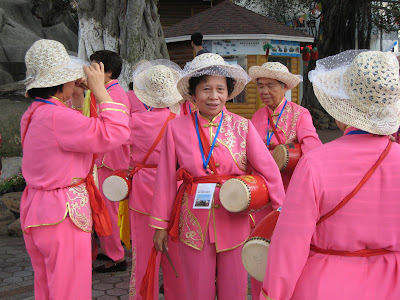On our first day here, we checked into getting cell phone service. In the process, we met Fenny, an English teacher at Xiamen University. We made plans to have lunch today. She picked us up in front of our classroom in her car. Since few people have cars here and we take the bus, riding in a small vehicle was a new experience. Fenny zipped around the one-way campus roads as if there were no pedestrians and no other cars to worry about.
Fenny picked a first class restaurant on the beach not too far from campus. Brightly-lit fish tanks lined the walls throwing off a vibrant glow.
 A variation on this theme are buckets of various sea critters for sale at street markets.
A variation on this theme are buckets of various sea critters for sale at street markets.

|

|

|

|

|

|
 Then came a citrus flavored, cold, tapioca soup. There were mixed interpretations amongst the critics - Calliope tasting a mango flavor.
Then came a citrus flavored, cold, tapioca soup. There were mixed interpretations amongst the critics - Calliope tasting a mango flavor.
 This was followed by a cold black seaweed jelly soup and some cooked greens.
This was followed by a cold black seaweed jelly soup and some cooked greens.
 There are many varieties of cooked green leaves in Xiamen. And the way we say vegetarian seems to conjure up cooked green leaves in the minds of Xiamen restaurant staff. We have eaten a number of varieties of lettuce, mustard, and cabbage. But we may be eating wild, unkown greens as well.
There are many varieties of cooked green leaves in Xiamen. And the way we say vegetarian seems to conjure up cooked green leaves in the minds of Xiamen restaurant staff. We have eaten a number of varieties of lettuce, mustard, and cabbage. But we may be eating wild, unkown greens as well.
Back to lunch. More dishes came out, but I was too busy eating to take more pictures. In my last food entry, I mentioned that in Xiamen, vegetarian eating was easy. In the last couple of days, it has gotten a bit trickier. I ordered spicy tofu two nights ago and got a tasty dish with pork bits scattered throughout. Fenny, who was born and raised in China, did all the ordering today. She empahasized and reiterated that many of the dishes should contain no meat and no seafood. But one came with bits of pork and another with bits of shrimp. We still had PLENTY of vegetarian food. And they were most apologetic. Apparently, it's not just a foreigner's inability to order properly. I suppose that's good news and bad news. The good news is that we order properly. The bad news is that it doesn't matter.
Fenny drove us back to campus. Leaving the restaurant, there was a traffic divider that prevented her from turning left. Or so I thought. There was no oncoming traffic in either direction, so what does it matter which side of the road you drive on? Cyclists routinely travel on the wrong side of the road here; we pass them on the bus every day. I have heard it said that in China, lane markers, traffic signals, road signs are taken as suggestions.A tasty lunch, new foods, and a new friend. What a treat! Fenny insisted on paying for the meal. The Chinese people continue to impress me with their overwhelming hospitality.







































